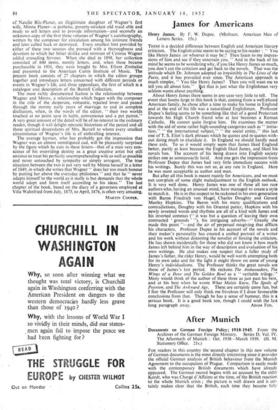• James for Americans
Henry James. By F. W. Dupee. (Methuen. American Men of Letters Series. 15s.) THERE is a decided difference between English and American literary criticism. The English critic seems to be saying to his reader : " You like Henry James [or whoever it may be]? Then listen to my impres- sions of him and see if they entertain you. " And in the back of his mind he seems to be wondering why, if you like Henry James so much, you don't cut the criticism and get back to the novels. That was the attitude which Dr. Johnson adopted so irresistibly in Thy Lives of the Poets, and it has prevailed ever since. The American approach is much simpler, " You like Henry James? Then you will want me to tell you all about-him." 'jut that is just what the Englishman very seldom wants about anything. '
About Henry James there seems in any case very little to tell. The event that looms large in this book is that, coming from a well-placed American family, he chose after a time to make his home in England and at the end of his life was a naturalised Englishman. Professor Dupee's feeling seems to be something like thal of a good Protestant towards his High Church friend who at last 'becomes a Roman Catholic. He cannot quite forgive him. He examines the matter with the aid of some rather high-sounding categories such as " initia- tion," " the international subject," " the social entity," this last one of T. S. Eliot's dark phrases which he quotes and re-quotes with- out doing much to elucidate it. In England we should hardly need these aids. To us it would simply seem that James liked England better, partly at least because the English liked James, and liked his, novels too. The account of his being drawn into English society strikes one as unnecessarily lurid. And one gets the impression from Professor Dupee that James had very little immediate success with his writings. Surely this was not so, at any rate in England. Here he was most acceptable as author and man.
But after all this book is meant mainly for Americans, and we must not complain of some slight maladjustment to the English outlook. It is vet), well done. Henry James was one of those all too rare authors who, having an unusual mind, have managed to create a style to match it. He is in this respect to be reckoned in his own generation with Baron Friedrich von Hugel, Charles Doughty and Gerard Manley Hopkins. The Baron with his many qualifications and contradictions, Doughty with his Oriental patter, Hopkins with his newly invented words and rhythms are all of a kind with James and his inverted commas (" it was but a question of leaving their own contracted grounds ' "), his intriguing adverbs—" Greatly she made this point "—and the air of perpetual misgiving that afflicts his characters. Professor Dupee in his account of the novels and their maker's personality has created a unified portrait of a writer and his work without distorting the novelist of forcing the criticism. He has shown incidentally for those who did not know it how much James left behind him in the way of description and evaluation of his own writings. He also makes one suspect that a fuller study of James's father, the elder Henry, would be well worth attempting both for its own sake and for the light it might throw on some of young Henry's individualisms. The Professor thinks the great novels are those of James's last period. He reckons The Ambassadors, The Wings of a Dove and The Golden. Bowl as a " veritable trilogy." Many would think of the author of these three as just past his best, and at his best when he wrote What Maisie Knew, The Spoils of Poynton, and The Awkward Age. These are certainly more fun, but I fear the Professor will only think me frivolous if I draw favourable conclusions from that. Though he has a sense of humour, this is a serious book. It is a good book too, though I could wish the last


































 Previous page
Previous page